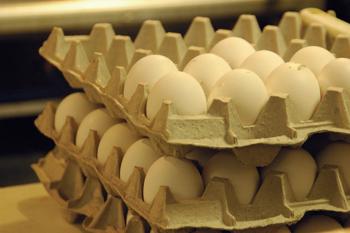Whether you eat them scrambled, poached, over easy or sunny-side-up, an egg a day can help keep the pounds away. SELF magazine editor Lucy Danziger said this month in an article, despite their “bad” reputation eggs can be a healthful option “as long as you know how to fix them.” According to Danziger’s article, the trick to eating eggs is to avoid cooking them with tons of fat.
And eggs pack plenty of protein, which remains a primary benefit of egg consumption, said Nicole Whatley, University registered dietician. “You hear about these sumo wrestlers and athletes eating eggs because it’s a good source of protein,” Whatley said. These protein powerhouses give dieters the perception of fullness, which leads to decreased food consumption and potential weight loss,” Whatley said. Danziger’s article recommended eating eggs with a slice of whole wheat toast because the fiber helps the dieter stay full longer. “In fact, people who had eggs and toast for breakfast ate 419 fewer calories the following day than those who had a bagel with cream cheese and yogurt,” Danziger wrote. Dieters may be surprised to discover that eggs carry few calories and fat. A large egg contains 75 calories and only five grams of fat. But the general public has been plagued by mixed messages about eggs for years, leading to a muddled understanding of the relationship concerning eggs, fat and cholesterol, Whatley said. “Consumers are confused because we have two different messages. They used to say that eating eggs were bad because of the cholesterol. Now, recently, we’re learning that eggs are OK,” Whatley said. “The current consensus is you can have the white, just watch the yolk.” In large eggs, the yolk contains 60 calories and the egg white contains 15. A large yolk accounts for more than two-thirds of the recommended daily intake of cholesterol and holds all of the egg’s fat. The public also generally associates eggs with other health problems like heart disease. But researchers at the University of Surrey in the United Kingdom found that people who ate one or more eggs per day where at no higher risk for heart disease than their non-egg-eating counterparts. The Indo-Asian News Service reported that “nutritionists now know it is the saturated fats in food, not dietary cholesterol, that raises blood cholesterol levels, a risk factor for heart attacks.” Whatley recommended limiting egg intake to no more than five per week – two if one suffers from high blood cholesterol. But Danziger wrote that dieters may eat up to an egg a day without adversely affecting cholesterol levels. The Indo-Asian News Service reported that the rules of eating eggs are even more lax than what Whatley and Danziger suggested. According to the British government’s Foods Standards Agency, as long as eggs play a part in a balanced diet there is no limit. Whatley said incorporating eggs into an eating plan is easy “because they’re so versatile.” “You can do eggs with every basic food group,” Whatley said. “You can do an omelet or a breakfast burrito, you can do a scrambled sandwich, you can do cheese, [or] you can chop up onions.” But not everyone is wild about eggs. Grace Davis, biochemistry freshman, said, “I don’t like eggs,” and she would not consider incorporating them into her eating plan despite the proposed benefits. But Joel Edwards, fourth-year architecture student, said he enjoys eating his eggs scrambled. “I’d try [eating more eggs] to see if it works,” Edwards said. “I remember Rocky drinking [raw eggs] for his diet to work out, so I guess they’re good for protein.” But Whatley warned against consuming raw eggs to try to boost protein intake because “raw egg yolks, in addition to having a potential for causing salmonella food poisoning, have an anti-vitamin called avidin, which reduces the amount of vitamin B obtained from the egg.”
—–Contact Leah Square at lsquare@lsureveille.com
Over Easy
January 24, 2007

Dozens of eggs await their destiny on the skillet at Louies Cafe. New studies show eggs may help people lose weight.



